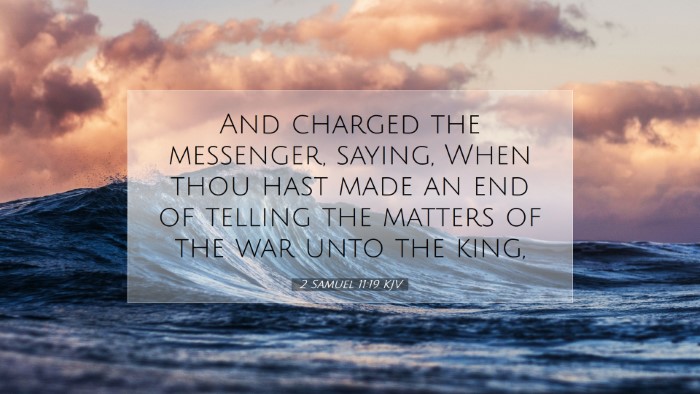Commentary on 2 Samuel 11:19
Verse: 2 Samuel 11:19 - "And charged the messenger, saying, When thou hast made an end of telling the matters of the war unto the king,"
Contextual Overview
In the backdrop of chapters 11 and 12 of 2 Samuel, we find King David’s significant moral failure and the subsequent consequences of his actions. The narrative begins with David's adultery with Bathsheba and culminates in the orchestrated death of her husband, Uriah. This verse is pivotal as it reflects the king's manipulation of events concerning the war with the Ammonites and his attempt to control the narrative that would reach him regarding the battlefield—demonstrating both his authority and moral decline.
The Messenger's Role
The messenger is a crucial figure in this passage as he becomes the vehicle for communicating the results of the battle to David. This role mirrors the role of an apostle or prophet, serving as a conduit between God (or, in this case, the king) and the people.
Matthew Henry observes that the sending of the messenger speaks volumes about the nature of kingship during this era. A king's command was to be followed, and in that command lay life or death, depending on the outcomes and the messages conveyed.
The Charge of the Messenger
In the context of verse 19, David gives explicit instructions about how the message should be framed. David's manipulation indicates not just a political maneuver but also a moral failing. He is attempting to sanitize what is sure to be grim news of Uriah's death while projecting an image of strategic wisdom.
- Albert Barnes mentions the calculated approach that David is taking; he seeks to portray the incursion into the enemy territory where Uriah died not as a tactical blunder but as a necessary, albeit tragic, loss in the service of the kingdom.
- Adam Clarke further expounds on the theme of misdirection. He notes that David’s sending of the messenger reveals how kings can bend the truth to maintain control and power, a recurring theme throughout the biblical narrative.
Spiritual and Theological Insights
This verse also carries heavy theological implications. It teases apart the nature of God’s justice. David, as the anointed king, is intertwining himself with deceit—an alliance he will soon learn is tenuous at best.
Matthew Henry notes that the tragedy of sin is not just personal but communal. David's actions send rippling consequences through Israel, indicating that the king's sin has kingship implications. A king is a representative of God’s governance, and David's sin impacts his role and the nation's standing before God.
The Nature of War and Leadership
The nature of war and the ethics surrounding leadership are paramount themes that arise in this verse. Leaders must navigate the dual realities of authority and accountability.
- Albert Barnes asserts that David's orders show the often brutal reality of warfare—decisions made at a distance can lead to death and destruction that leaders must bear moral responsibility for.
- Adam Clarke explores the ramifications of leadership choices, emphasizing that leaders who employ deception to manage narratives will always face the unyielding consequences of truth.
Conclusion
In conclusion, 2 Samuel 11:19 serves as a critical juncture in the ongoing narrative of David's reign. It highlights the interplay of power, morality, and divine justice. As theologians and scholars reflect on this text, it underscores the importance of integrity in leadership and the catastrophic nature of sin that can lead even the greatest among us into profound error.
The verse invites deep contemplation about how narratives are shaped, who holds the authority to frame such narratives, and the inevitable fallout that following a morally bankrupt path can yield—a call to introspection for modern leaders within the church and beyond.


